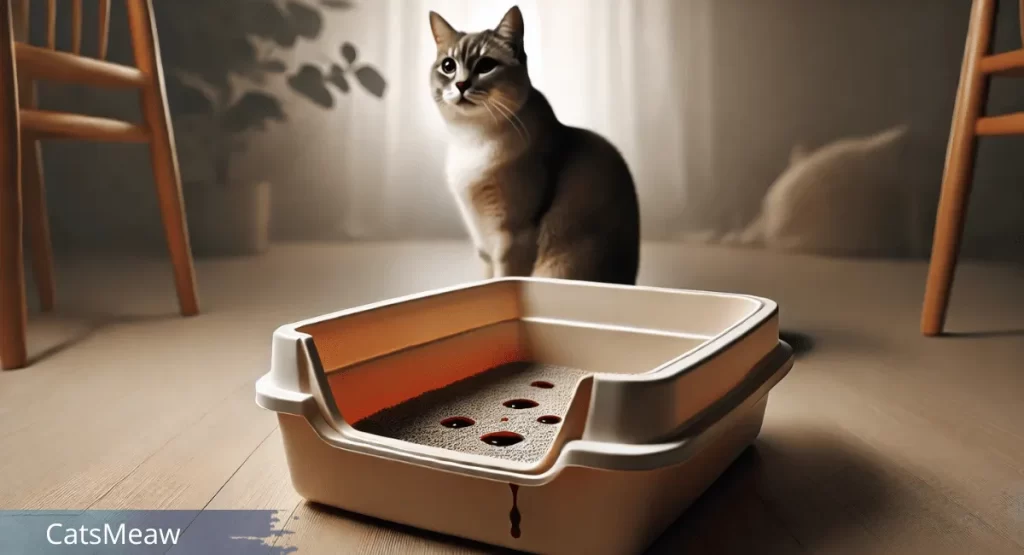Seeing blood in your cat’s urine can be alarming and is a clear sign that something is wrong with your pet’s urinary system. Blood in cat urine, or hematuria, can stem from a variety of conditions, some of which are mild while others may require urgent veterinary attention. It’s essential for cat owners to understand the potential causes, symptoms to look out for, and the appropriate steps to take when encountering this issue.

This article explores the main causes of blood in cat urine, how to recognize related symptoms, and the best course of action to ensure your feline companion’s health.
Table of Contents
Causes of Blood in Cat Urine
- Urinary Tract Infections (UTIs)
UTIs are a common cause of blood in cat urine, especially in older cats or those with pre-existing health conditions. Bacteria can enter the urinary tract, causing inflammation and irritation that leads to blood appearing in the urine. Cats with UTIs may also strain to urinate or have frequent accidents outside the litter box. - Bladder Stones
Bladder stones can form when minerals in a cat’s urine crystallize and solidify. These stones can irritate the bladder lining, leading to bleeding. Depending on the size and location of the stones, a cat might show discomfort while urinating, or they may exhibit other signs of pain. - Kidney Infections
Infections in the kidneys, known as pyelonephritis, can also cause hematuria. The kidneys are responsible for filtering waste from the blood and producing urine. If infected, they may not function properly, leading to blood in the urine along with other symptoms like lethargy and a decrease in appetite. - Tumors
Both benign and malignant tumors in the urinary tract can cause blood in the urine. These tumors may be found in the bladder, kidneys, or along the urinary tract. Older cats, in particular, are more susceptible to urinary tumors. - Feline Lower Urinary Tract Disease (FLUTD)
FLUTD is an umbrella term for several conditions that affect the cat’s bladder and urethra. These conditions include inflammation, infections, and blockages. FLUTD is more common in male cats and often leads to hematuria, frequent urination, and straining.
Related: Best Guide How To Remove Cat Urine
Symptoms to Watch For
In addition to blood in the urine, there are several other symptoms that can indicate an underlying issue with your cat’s urinary system:
- Frequent trips to the litter box: Your cat may attempt to urinate often but only produce small amounts.
- Straining or vocalizing: A cat that is uncomfortable may strain or vocalize while trying to urinate.
- Changes in behavior: You might notice your cat becoming irritable, hiding, or avoiding the litter box.
- Lethargy: If your cat is less active or less interested in its surroundings, this could be a sign of discomfort.
- Loss of appetite: Cats dealing with infections or inflammation may lose their appetite or show signs of nausea.
Diagnosing the Condition
If you notice blood in your cat’s urine, it’s essential to seek veterinary attention right away. Your veterinarian will likely perform several diagnostic tests to determine the cause of the hematuria:
- Urinalysis
A urinalysis is the first step in diagnosing the problem. The test looks at the chemical composition of your cat’s urine to check for the presence of crystals, bacteria, blood, and other abnormalities. - Blood Work
Blood tests can help determine if there is an infection, kidney disease, or any systemic issues contributing to the problem. - Imaging (Ultrasound or X-rays)
If bladder stones or tumors are suspected, your vet may recommend ultrasound or X-rays to get a clearer picture of your cat’s urinary system. These tests can help detect the presence of stones, blockages, or abnormal growths.
What to Do if You Notice Blood in Your Cat’s Urine

If you observe blood in your cat’s urine, there are immediate steps you should take:
- Collect a urine sample: If possible, collect a sample of your cat’s urine for your vet to examine.
- Schedule a vet appointment: Call your veterinarian as soon as you notice the blood. Hematuria can indicate serious health problems that require prompt treatment.
- Monitor your cat’s behavior: Take note of any other symptoms, such as lethargy, frequent urination, or signs of pain, and report these to your vet.
Related: Cat’s Litter Box: Best Place Put It in the House?
Treatment Options
- Medication and Antibiotics
For infections like UTIs or kidney infections, your vet will likely prescribe antibiotics to clear up the infection. Anti-inflammatory medications may also be given to reduce irritation in the urinary tract. - Surgery
If bladder stones or tumors are the cause of the bleeding, surgery may be required to remove them. In some cases, smaller stones can be dissolved with a special diet, but larger stones often need to be surgically extracted. - Dietary Changes
In cats prone to bladder stones or urinary crystals, your vet may recommend a prescription diet formulated to dissolve existing stones or prevent new ones from forming. Proper hydration is also crucial, so you may need to encourage your cat to drink more water.
Preventing Future Incidents
Preventing blood in your cat’s urine depends on maintaining good urinary health:
- Ensure proper hydration: Provide your cat with fresh water at all times and encourage them to drink by using water fountains or offering wet food.
- Feed a balanced diet: Consult with your vet about the best diet for your cat to reduce the risk of urinary issues.
- Routine vet check-ups: Regular vet visits can help catch any developing issues early before they become serious.
Conclusion
Blood in your cat’s urine is a sign that something is wrong, and addressing it quickly is key to your cat’s health. Whether caused by a UTI, bladder stones, or a more serious condition like a tumor, veterinary care is essential. By monitoring your cat for signs of discomfort, seeking timely diagnosis, and following treatment plans, you can help ensure your feline friend stays healthy.
FAQs
1. Can stress cause blood in cat urine?
Yes, stress can sometimes lead to urinary issues in cats, particularly in conditions like Feline Lower Urinary Tract Disease (FLUTD).
2. What should I do if my cat refuses to use the litter box?
If your cat avoids the litter box, this could be a sign of discomfort, especially related to urinary issues. Contact your vet for advice.
3. Can diet help prevent blood in cat urine?
Yes, certain prescription diets can help manage or prevent conditions like bladder stones and urinary crystals.
4. Is blood in cat urine always serious?
While it may not always indicate a life-threatening condition, blood in the urine should never be ignored and requires a vet visit.
5. How can I increase my cat’s water intake?
Try using water fountains, offering wet food, or placing multiple water bowls around your home to encourage your cat to drink more.
